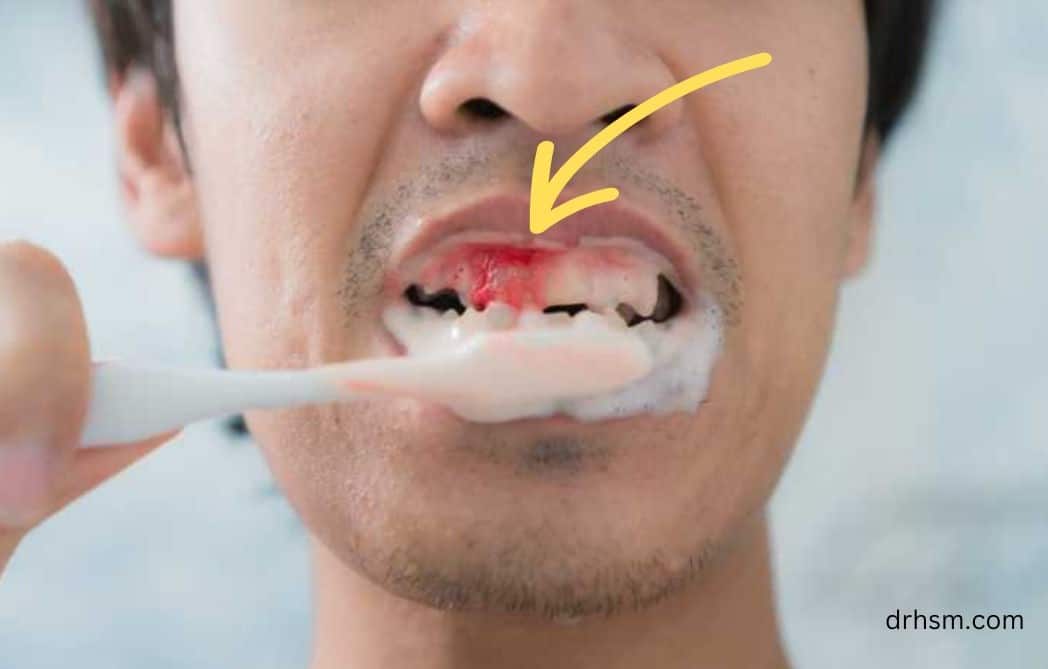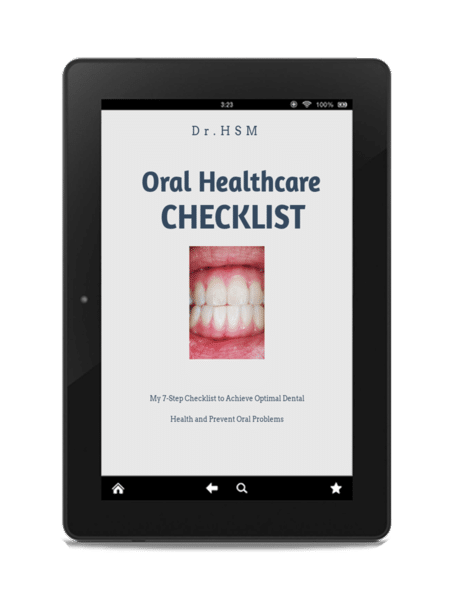Hi & welcome to another blog post.
I have been seeing a lot of cases where patients come to me and report for bleeding gums...
If you are facing similar condition, read this post so i'll be telling you what is the cause for bleeding gums and what you can do about it.

Bleeding gums while brushing teeth can be a concerning issue for many people. It is important to understand that this is not a normal occurrence and can be a sign of serious dental problems.
If you experience bleeding gums, it is crucial to identify the underlying cause and take appropriate action to prevent further damage.
Causes of Bleeding Gums
- Gum Disease: Gum disease, also known as periodontal disease, is one of the most common causes of bleeding gums. It is caused by a buildup of plaque and bacteria on teeth and gums. Gum disease is characterized by inflammation, bleeding, and sometimes pain. If left untreated, gum disease can lead to tooth loss.
Brushing Too Hard: Brushing your teeth too hard can cause bleeding gums. This is because the excessive pressure can damage the gum tissue and cause it to bleed. It is important to use a soft-bristled toothbrush and gentle circular motions while brushing.
Hormonal Changes: Hormonal changes during puberty, pregnancy, and menopause can cause gum inflammation and bleeding. During these times, it is important to maintain good oral hygiene habits and visit your dentist regularly.
Nutritional Deficiencies: A lack of vitamin C and vitamin K in your diet can cause bleeding gums. These vitamins are important for maintaining healthy gum tissue. Eating a balanced diet that includes plenty of fruits and vegetables can help prevent nutritional deficiencies.
Medications: Some medications, such as blood thinners, can cause bleeding gums. If you are taking any medications and experiencing bleeding gums, be sure to speak with your healthcare provider.
New Dental Products: Using a new toothbrush or toothpaste can cause bleeding gums. It may take some time for your gums to adjust to the new products. If bleeding persists, consider switching back to your previous products or consulting with your dentist.
Discover My Ultimate Checklist for Maintaining Healthy Teeth and Gums on a Daily and Weekly Basis
From Brushing to Flossing: Follow My 7-Step Checklist to Achieve Optimal Dental Health and Prevent Oral Problems.

Remedies for Bleeding Gums
- Improve Oral Hygiene: Brush your teeth twice a day with a soft-bristled toothbrush and floss at least once a day. This will help remove plaque and bacteria from your teeth and gums. Be sure to brush gently and use circular motions to avoid damaging your gum tissue.
- Use an Antiseptic Mouthwash: Antiseptic mouthwash can help kill bacteria in your mouth and reduce inflammation. Rinse your mouth with an antiseptic mouthwash after brushing and flossing.
- Change Your Toothbrush: If you are brushing too hard, switch to a soft-bristled toothbrush. Replace your toothbrush every three to four months.
- Improve Your Diet: Eat a balanced diet that includes plenty of fruits and vegetables. These foods are rich in vitamin C and other nutrients that are essential for healthy gums.
- Consult with Your Dentist: If your bleeding gums persist, it is important to consult with your dentist. Your dentist can identify the cause of your bleeding gums and provide appropriate treatment. In some cases, a professional cleaning or scaling and root planing may be necessary to remove plaque and tartar buildup.
Preventing Bleeding Gums
- Regular Dental Checkups: Regular dental checkups are important for maintaining healthy gums. Your dentist can identify early signs of gum disease and provide appropriate treatment. It is recommended to visit your dentist every six months for a checkup and cleaning.
- Quit Smoking: Smoking can cause gum disease and increase your risk of bleeding gums. Quitting smoking can help improve your overall oral health.
- Limit Alcohol Consumption: Excessive alcohol consumption can cause gum disease and increase your risk of bleeding gums. Limit your alcohol consumption to improve your oral health.
- Manage Stress: Stress can cause inflammation in the body, including the gums. Managing stress through relaxation techniques, such as meditation or yoga, can help reduce inflammation and prevent bleeding gums.
- Get Enough Sleep: Sleep is essential for overall health, including oral health. Lack of sleep can weaken your immune system and increase your risk of gum disease. Be sure to get at least seven to eight hours of sleep each night.
Use a Soft-Bristled Toothbrush: Using a hard-bristled toothbrush or brushing too hard can damage the gums and cause them to bleed. Use a soft-bristled toothbrush and gently brush in a circular motion to avoid causing damage to the gums.
Visit Your Dentist Regularly: Regular dental checkups and cleanings are essential for maintaining good oral health and preventing bleeding gums. Your dentist can identify early signs of gum disease and provide treatment before it progresses and causes further damage.
Use Mouthwash: Mouthwash can help reduce the buildup of bacteria in the mouth and prevent gum disease. Choose an antibacterial mouthwash that contains fluoride to help strengthen the teeth and prevent tooth decay.
Consider Professional Teeth Cleaning: If you have stubborn plaque buildup or tartar on your teeth, a professional teeth cleaning can help remove it and prevent gum disease. Your dentist or dental hygienist can perform a deep cleaning to remove any buildup that cannot be removed with regular brushing and flossing.
Be Mindful of Your Diet: Eating a balanced diet that is rich in vitamins and minerals is essential for maintaining good oral health. Avoid sugary and acidic foods and drinks, which can erode the enamel of your teeth and cause gum disease. Consume FOODS rich in Vit C
Use Floss: Flossing is an essential part of good oral hygiene and can help remove food particles and bacteria from between your teeth and along the gum line. Be gentle when flossing to avoid damaging the gums and causing them to bleed.
Treat Underlying Medical Conditions: Certain medical conditions, such as diabetes or leukemia, can cause bleeding gums. If you have an underlying medical condition, be sure to follow your doctor's recommendations for managing your condition to help prevent bleeding gums.
Conclusion
In conclusion, bleeding gums while brushing teeth can be a sign of serious dental problems, but it can also be easily prevented and treated with the right care.
Improving your oral hygiene, eating a balanced diet, and taking care of your overall health can all help prevent bleeding gums and keep your gums healthy and strong.
If you experience bleeding gums, be sure to consult with your dentist to identify the underlying cause and take appropriate action to prevent further damage. With the right care and attention, you can enjoy healthy gums and a beautiful smile for years to come.
Remember, prevention is key when it comes to oral health. Practicing good oral hygiene habits and visiting your dentist regularly can help prevent bleeding gums and other dental problems.
If you have any concerns about your oral health, be sure to speak with your dentist or healthcare provider. They can provide the necessary guidance and treatment to ensure that your gums and teeth remain healthy and strong.
Discover My Ultimate Checklist for Maintaining Healthy Teeth and Gums on a Daily and Weekly Basis
From Brushing to Flossing: Follow My 7-Step Checklist to Achieve Optimal Dental Health and Prevent Oral Problems.

